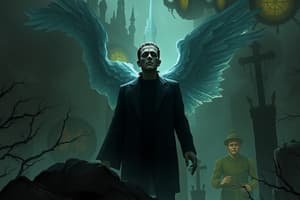Podcast
Questions and Answers
What period did Romanticism primarily occur in Western civilization?
What period did Romanticism primarily occur in Western civilization?
- Early 19th to late 20th century
- Late 18th to mid-19th century (correct)
- Early 18th to early 19th century
- Late 17th to mid-18th century
Romanticism embraced modernity and industrialization.
Romanticism embraced modernity and industrialization.
False (B)
What was one way Luddites protested against industrialization?
What was one way Luddites protested against industrialization?
By sabotaging industrial machines and factories.
The term 'fortitude' refers to the strength of mind that enables a person to encounter _______.
The term 'fortitude' refers to the strength of mind that enables a person to encounter _______.
Which literary character was created by Charles Dickens?
Which literary character was created by Charles Dickens?
Match the following terms with their definitions:
Match the following terms with their definitions:
Romanticism believed in the value of direct subjective experience over scientific rationalization of nature.
Romanticism believed in the value of direct subjective experience over scientific rationalization of nature.
Nature for Romantics was considered an organic entity, constructed by a _______ imagination.
Nature for Romantics was considered an organic entity, constructed by a _______ imagination.
What is a characteristic of the Romantic Hero?
What is a characteristic of the Romantic Hero?
The Byronic Hero has a positive view of humanity.
The Byronic Hero has a positive view of humanity.
What does Edmund Burke suggest about nature in his work 'Philosophical Enquiry'?
What does Edmund Burke suggest about nature in his work 'Philosophical Enquiry'?
The first Gothic novel is 'The Castle of ______'.
The first Gothic novel is 'The Castle of ______'.
Match the following alchemists with their contributions:
Match the following alchemists with their contributions:
What is the primary aim of alchemy?
What is the primary aim of alchemy?
Describe the concept of 'Pathetic Fallacy'.
Describe the concept of 'Pathetic Fallacy'.
Victor Frankenstein's interests include personal glory and supernatural potentials.
Victor Frankenstein's interests include personal glory and supernatural potentials.
Flashcards are hidden until you start studying
Study Notes
Romanticism
- Romanticism was a cultural movement emerging in the late 18th century, emphasizing imagination, the irrational, and nature over modernity and industrialization.
- Industrialization's effects led to the rise of a new class of factory owners, increased wealth for some, cheaper production, and social issues.
- Romantics were often critical of the negative effects of industrialization, with writers like Charles Dickens (Oliver Twist) and the Luddites showcasing its potential for dehumanization and social unrest.
- Deism: The belief that reason and natural order are sufficient to understand the universe.
- Embedded narratives: stories within stories
- Epistolary narratives: frame stories
Frankenstein
- The novel explores the dangers of unchecked ambition and the pursuit of knowledge.
- Victor Frankenstein is a Byronic hero, driven by a desire to surpass his peers, but ultimately consumed by guilt and regret.
Nature
- Romantics viewed nature as a source of inspiration, beauty, and spiritual renewal.
- Nature was seen as a healing power and refuge from the artificial constraints of civilization.
- They believed nature was "organic," not artificial, and facilitated a closer connection to the divine through imagination and emotion.
Critique of Scientific Rationalization
- Romantics argued that science could only understand the "secondary" qualities of experience, not the "primary" ones, which required direct subjective experience to understand.
- They questioned the relentless pursuit of knowledge, believing it could lead to disastrous consequences, as illustrated in Mary Shelley's Frankenstein.
The Sublime
- Edmund Burke’s Philosophical Enquiry defined the sublime as the most powerful emotional experience, elicited through awe, terror, and danger, often connected with intense natural phenomena.
Gothic Literature
- Gothic literature emerged as a genre that combined romance and horror.
- It aimed to thrill and terrify readers by exploring themes of darkness, supernatural forces, and psychological torment.
- The Castle of Otranto by Horace Walpole (1764) is considered the first Gothic novel.
Alchemy
- Medieval chemical science and philosophy system aiming to transmute base metals (iron, copper) into noble metals (gold).
- Mary Shelley considered alchemy "sad trash" and an outdated system, reflecting the shift away from traditional practices toward modern science.
- Victor Frankenstein is interested in alchemy for personal glory, fear of death, and potential supernatural power.
Electricity
- Frankenstein explores the relationship between electricity and life.
- Victor Frankenstein’s interest in electricity stems from his early experiences, including an encounter with an electrical storm.
Pathetic Fallacy
- Literary device where the weather or natural elements reflect the characters' emotional states.
Volume 2: Chapter 1
- The monster demonstrates the capacity for love, virtue, and kindness despite his grotesque appearance.
- He experiences guilt and remorse for his actions, indicating a complex moral consciousness.
The Rime of the Ancient Mariner
- The novel uses allusions to Samuel Taylor Coleridge's The Rime of the Ancient Mariner to act as a cautionary tale.
- The poem's themes of nature's power, human transgression, and the importance of empathy resonated with the romantic perspective and the novel's exploration of morality.
Studying That Suits You
Use AI to generate personalized quizzes and flashcards to suit your learning preferences.




